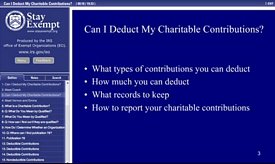Why
Do I Need An Appraisal? | Individuals
and Businesses need appraisals for many varied reasons. For example, you may need
an appraisal for: - Insurance:
When you apply for Fine Arts or All Risks Insurance coverage.
- Insurance
Claims: When you need further documentation for a claim filed with your Insurance
Company.
- Divorce
Settlement: When you need personal property appraised for equitable distribution.
- Charitable
Donations: When you are seeking a tax write-off for a non-cash charitable
donation.
- Probate
and Estate Settlement: When you need a personal property evaluation for settlement
of an estate.
- Estate
Planning: When you are seeking the best approach to planning for your estate.
- Fair
Market Value: When you just want to know what something may be worth in today's
market.
- And
for many other legal and personal reasons.
|
What
Type of Appraiser Should You Choose? | If
you are seeking a tax deduction for a non-cash charitable contribution, the IRS
typically requires a written appraisal by a "Qualified Appraiser" to
substantiate the validity of your deduction. The IRS further defines a "Qualified
Appraiser" by using six criteria: - They
must have earned a recognized appraisal designation, or otherwise have the minimum
amount of education and experience requirements as prescribed by the Treasury
Department Secretary.
- They
must demonstrate verifiable education and experience in valuing the type of property
they are appraising.
- They
must not have been prohibited from practicing before the IRS.
- Their
appraisal must append the required Certification Statement.
- They
must regularly prepare appraisals for which they are paid.
- They
are not an "Excluded" individual, which means they are not related to,
or too closely aligned or affiliated with, the individual whose items are being
appraised.
Be
certain that you are dealing with a "Qualified Appraiser". |
Why
Can't I Just Consult a Book or Price Guide? |  Price
Guides can point you in the right direction, but the prices found in many published
price guides are out-dated by the time they are released. When you consider that
it takes approximately one year from the date a manuscript is received by a publisher
to its release date…when you consider that it takes an average of one year
for the typical author to complete a book…when you consider that the vast
majority of prices found in many price guides were accumulated prior to the date
the author started writing the book…you will then understand that most prices
found in price guides may be 3-4-5 years old on the release date of the new price
guide. Price
Guides can point you in the right direction, but the prices found in many published
price guides are out-dated by the time they are released. When you consider that
it takes approximately one year from the date a manuscript is received by a publisher
to its release date…when you consider that it takes an average of one year
for the typical author to complete a book…when you consider that the vast
majority of prices found in many price guides were accumulated prior to the date
the author started writing the book…you will then understand that most prices
found in price guides may be 3-4-5 years old on the release date of the new price
guide.
|
What
About Verbal Appraisals from Friends & Family Members? |
You get what you pay for. Although there may be exceptions, in our opinion the
vast majority of free verbal appraisals that you may receive from well-intended
friends or family members are nothing more than uneducated guesses. If their Free
Appraisal (i.e., guess) is too low, you may end up giving the merchandise away
for nothing. If their Free Appraisal (i.e., guess) is too high, you may never
find a buyer. |
What
About Free Appraisals by Jewelry Stores,
Newspaper Ads, Out-of-Town Buyers
in Hotels, etc.? |
 This
is one of my pet peeves. A true appraisal is an honest opinion of value, made
by an unbiased and impartial appraiser. "Free Appraisals" offered by
Jewelry Stores, Pawn Shops, Transient Buyers in Hotel Rooms, and other such concerns
are simply NOT appraisals. Rather, these are nothing more than "offers to
buy". And usually they represent the lowest dollar amount that the evaluator
thinks you will accept. Be wary of these "Free Appraisals". This
is one of my pet peeves. A true appraisal is an honest opinion of value, made
by an unbiased and impartial appraiser. "Free Appraisals" offered by
Jewelry Stores, Pawn Shops, Transient Buyers in Hotel Rooms, and other such concerns
are simply NOT appraisals. Rather, these are nothing more than "offers to
buy". And usually they represent the lowest dollar amount that the evaluator
thinks you will accept. Be wary of these "Free Appraisals". |
Should
I Sell to the Person Who Tells Me What It's Worth? |
There is a very obvious and inherent danger in selling to the individual who is
telling you what your items may be worth. They have a vested interested in making
you a low-ball offer, while intending to maximize their potential profit. When
you hire a professional appraiser, you are receiving a well-educated valuation,
from someone who has no interest in purchasing your item, and you will be receiving
a more accurate (and usually higher) valuation. |
Can
An Appraisal Be Based On Photographs? |
Although it is not our preferred approach, it can be done. An appraisal will usually
be more accurate and complete if the appraiser has the opportunity to hold, touch,
feel, and see the item being appraised. However, when that is not possible, it
may be possible for an appraisal to be completed based upon photographs, if they
are accompanied by accurate, detailed, and honest descriptions and condition reports. |
How
Can I Keep My Appraisal Fees Down? | -
Appraise important items only.
- Appraise
only items of value in excess of $xxxx ($100, $500. $1,000…you decide the
level).
- Unpack
and prepare prior to the Appraiser arriving.
- Bring
your items to the appraiser.
- Have
old receipts, letters, and important paperwork ready prior to the Appraiser arriving.
reports.
|
Definitions |
Appraisal: The act or process of developing an opinion of value. Appraise:
To set a value on personal, real or business property. Arm's
Length Transaction: A transaction which is conducted within an open market,
freely, without abnormal influences, such as collusion between buyer and seller. Effective
Date of Appraisal: The specific date as to when the valuation conclusion applies. Fair
Market Value: The price at which a property would change hands between a willing
buyer and a willing seller, neither being under any compulsion to buy or to sell,
and both having reasonable knowledge of relevant facts." Estate Tax Regulation
§ 20.2031-1 (b) expands the definition by stating "...nor is the fair
market value of an item of property to be determined by the sale price of the
item in a market other than that in which such item is most commonly sold to the
public, taking into account the location of the item wherever appropriate."
Online
Appraisal: Electronically-transmitted personal property appraisal reports
are based upon client-provided digital images, written descriptions, and condition
reports. Online Appraisals are typically valid in situations where the use of
photographs have traditionally been accepted. Personal
Property: All property that is not classified as real (estate) property. This
can include antiques, collectibles household items, jewelry, clothing, machinery,
furniture, artwork, and other items which are considered to be decorative, utilitarian,
or collectible. Replacement
Value: The highest price in terms of cash or other precisely revealed terms
that would be required to replace property with another of similar age, quality,
origin, appearance, provenance and condition, within a reasonable length of time
in an appropriate market. Since the items involved in many appraisals are either
one-of-a-kind, or were produced in limited quantity, many years ago, by individuals
who are no longer living, and are therefore no longer being produced, this definition
assumes that an item cannot be replaced new or with an exact duplicate. Therefore,
additional consideration must be made for the replacement as to artistic merit,
rarity, condition, desirability, and availability in today's market. USPAP:
An acronym for the Uniform Standards, Professional Appraisal Practices, as promulgated
by the Appraisal Institute. |
Call
us at (215)-264-4304 to discuss your personal property appraisal needs.
Michael
Ivankovich, GPPA, MPPA
Personal Property Appraiser
Doylestown, PA 18902
(215)-264-4304
E-Mail:
[email protected]
Web Site: www.michaelivankovichappraisals.com
|



